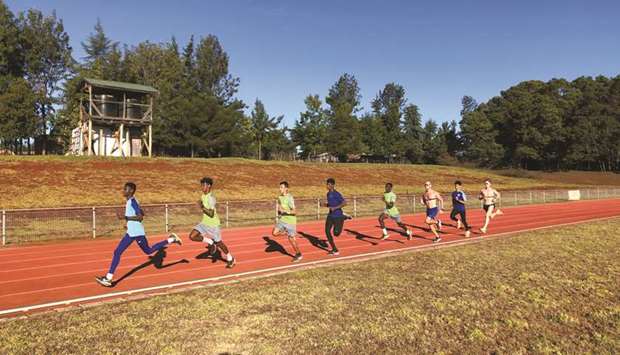For many, the small town of Iten in the highlands of Kenya is known under a different name. They call it the “Town of Runners.” Situated in the Rift Valley province, at approximately 35 kilometres from the city Eldoret, Iten lies at an altitude of 2,400 meters and is the centre of Kenyan middle and long-distance running.
Here you find hundreds of the fastest Kenyans living and training side by side including big names, such as former marathon world record holder and London marathon winner Wilson Kipsang, Olympic 1,500m champion Asbel Kiprop, world record holder and Olympic 800m champion David Rudisha and many more. Runners from all over the world go there to train – regardless of their target being to go to Olympics or just run for leisure.
During a high-altitude training camp from January 6-29 in the Kenyan Rift Valley, seven student-athletes from Aspire Academy find themselves in a unique environment that is known for producing some of the world’s best runners.”
The location of Iten allows us to have access to running trails, track, gym and pool with the additional benefit of being at altitude. Iten is an elite setting with many professional athletes training and living in this area and the exposure of the boys to this elite athlete environment amongst the best athletes in the world can provide them with increased motivation and help fast track them in the pursuit of their short and long term goals,” explains Steven Macklin, Aspire Academy’s Head Endurance Coach, who travelled with the boys alongside team guide Mohamed Alobaidly, physiologist Scott Cocking and physiotherapist Ivan Bartulovic.
The training camp offers intensive training for a select group of boys that are focused on performing well at some major events in 2020 such as the World U20 Championships and the GCC, Arab and Asian U20 Championships.
For Aspire Academy’s athletes Housem Hrabi, Abdalla ElKhair, Omar ElFadl, Hamza Hamiti, ElHafez Mahadi, Obied Bashir O Mahamed and Mohamed Assaad Kemel, these types of training camps are necessary to allow them focused and targeted training.
“Last year we ran the camp in the same location and with the aid of some specific testing and monitoring, we found the boys responded very well with improved physiological and haematological markers. It also prepares the athletes so that when they prepare for future international events, they know more about how they respond to this environment,” says Macklin.
“One of the highlights of the training camp so far was definitely the arrival of multiple Olympic gold medallist Mo Farah. Having the best distance runner in the world in the same training location is incredibly motivational and the boys got to chat to him face to face.” Britain’s most successful distance runner revealed that moving into a house full of Kenyan runners changed his whole attitude to training and racing.
The Olympic champion witnessed that they would start their first run before 7am, they would cook simple food like ugali, a maize flour mix rolled into a doughy lump.
After resting, they would train again in the afternoon, eat, rest and go to bed early.
Aspire Academy’s endurance team has definitely enjoyed the first half of the camp, especially the different training locations and the Kenyan countryside. The fresh air and stunning landscape make training very enjoyable and they have also interacted a lot with fellow athletes around them and have used the chance to watch their habits and behaviours and thereby learn from them.
“The challenge for the boys is the lack of oxygen in the air at altitude and the difficulty of training in these conditions. The food can also be overly healthy and quite plain at times with not much choice. Very different to Doha, but an excellent diet for athletes,” explains Macklin, who is looking forward to the second half of the training camp.

Aspire Academy’s student-athletes in action during their winter training camp in Iten, Kenya.
